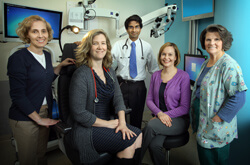
HeadWay
April 6, 2015

“These families already have so much to deal with,” says pediatric otolaryngologist Margaret Skinner. “We wanted to do what we can to ease their burden and improve their care.”
The Multidisciplinary Pediatric Aerodigestive Clinic
That’s one reason why Skinner and her colleagues in pediatric pulmonology, gastroenterology and speech pathology started the Johns Hopkins Multidisciplinary Pediatric Aerodigestive Clinic. There, patients and their families can meet with multiple physicians from any or all of these specialties in a single visit for both evaluation and treatment. Being able to see a multidisciplinary team of experts for these disorders at once has numerous benefits. Not only does it coordinate care, improve communication, and speed diagnosis and treatment, Skinner explains, but it also trims the number of appointments that patients need to attend and gives their physicians the option of combining surgical treatments into a single case, all of which can significantly reduce medical and out-of-pocket costs to families.
The clinic operates on Fridays at the Johns Hopkins Children’s Center, with one Friday a month devoted to patient clinic visits and the others to performing surgical procedures to investigate or treat aerodigestive disorders. Before each clinic, the team meets to discuss the specifics of individual cases. Then, at appointments, those specialists whose expertise relates best to a patient’s unique needs are present to give their opinions and plan the next steps. If surgery is necessary for diagnosis and treatment, the team works together in the operating room to complete all indicated procedures during a single case, reducing the number of times that patients, many with significant underlying pulmonary disease, are exposed to anesthesia and the related risks.
Saving Aerodigestive Disorder Patients and Their Families Time and Money
Recently, Skinner and the aerodigestive team performed an analysis to estimate how much money these measures might save patients. Their findings, published in JAMA Otolaryngology–Head and Neck Surgery in December 2014, show that attending a multidisciplinary clinic rather than appointments with individual doctors saved families about $182 per visit. Additionally, combining care when patients needed evaluation under anesthesia saved nearly $2,000 per episode. The team feels that savings were likely underestimated as related impacts, such as less lost time from work, could not be directly measured.
Skinner and her colleagues continue to look for ways to improve their care model and cut costs to patients’ families. “It is such a relief to parents,” Skinner says, “when they see that we care about the stress of their child’s illness on their family physically, emotionally and financially, and that we work hard to minimize those impacts when possible.”
For information: 443-997-6467

